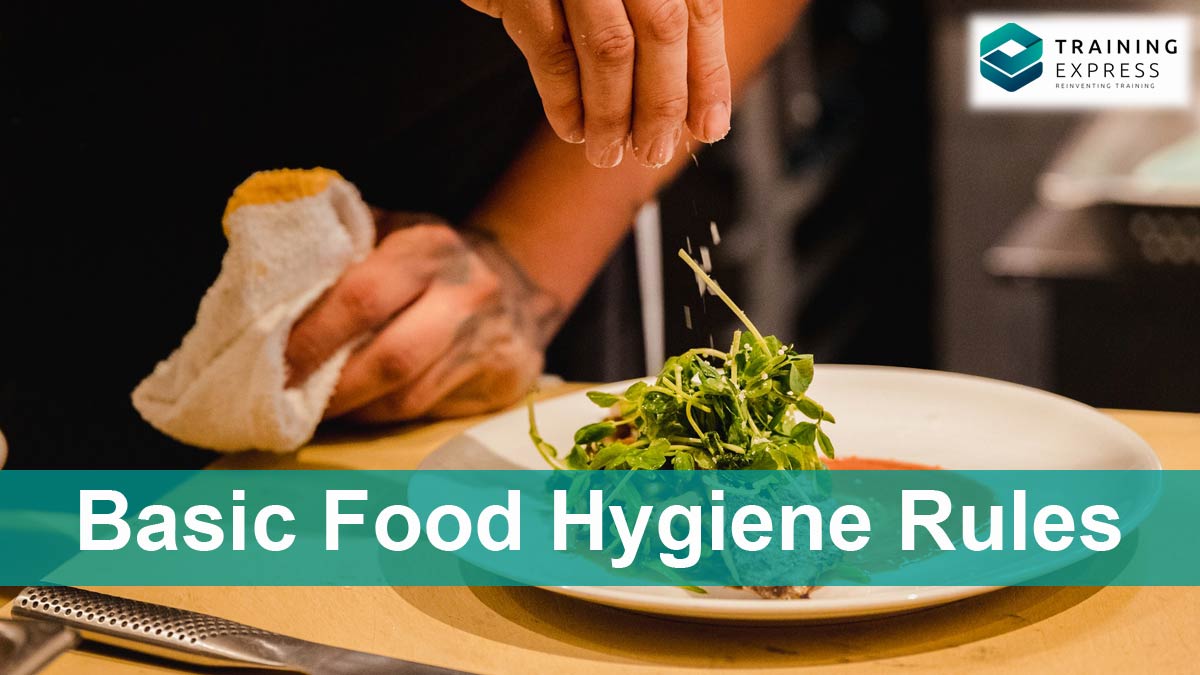
While food hygiene is not the legislation itself, a regular, disciplined and thorough food hygiene practice, along with knowledge of the basic food hygiene rules is necessary to comply with legislation for any catering business or employee.
To simplify matters, reliable food hygiene guidelines ensure that food is safe and catering businesses thrive while remaining compliant. Basic food hygiene guidelines can also prevent you from experiencing food poisoning when cooking at home too.
You’ll find out more about why food hygiene is essential and what steps you should take to adhere to food hygiene regulations if you work in the catering industry right here.
Table of Contents
Why is Food Hygiene Important?
There are many reasons why food hygiene is vital in any catering business, but the most crucial reason is to ensure that food is safe for human consumption.
Surprisingly, the upkeep of food hygiene from farm to fork can be complicated. At every point in the food chain, it’s vital to work hard to eliminate any risks that may compromise the safety of food, and that’s where food hygiene guidelines come in.
Aside from ensuring food is safe for consumption, there are also many other reasons why food hygiene is important too.
Here are just a few of the reasons:
1. To Be Successful In Business
Without adequate food hygiene, your food will be unsafe. It may not taste great; consumers may notice signs of poor hygiene on the premises where the food is served, or on the servers.
It’s probably fair to assume that nobody wants to eat unsafe, unclean food. Which means that without proper food hygiene, a business will not stay in business for very long because the customers will stop showing up.
Poor hygiene in a catering business is the fastrack to failure!
2. To Have a Successful Career
If your career is in catering, you’ll need to be an expert at food hygiene.
With the risks of safety to the public and your employer’s reputation on the line, you can be sure that nobody wants to hire somebody in the catering world who does not have good food hygiene knowledge and who does not put that knowledge in practice.
Tip! Use your food hygiene prowess to stand out for a job in catering by taking an online food hygiene course.
3. Because Food Hygiene Regulations Are Enforced
It’s a legal requirement to comply with all food hygiene regulations enforced at the time of operation. Which means that it’s a big deal!
Food Is A Risky Business
So why is there such an emphasis on ensuring that food is safe?
Well, that’s because the risks are high. But the good news is that they can be easily managed with just a few basic food hygiene guidelines.
Here are just a few food hygiene facts highlighting the risks involved when handling food.
- Parasites, bacteria and viruses found in food can cause food poisoning.
- You can’t tell from looking at food whether it’s contaminated or not, and in many cases, you can’t detect anything is ‘off’ by the taste or the smell of it either.
- Some forms of food poisoning can lead to serious illness such as kidney failure and even death.
- People who are ‘high-risk’ are more vulnerable to bacterias found in food.*
- Bacteria can multiply and breed in certain conditions which should be controlled.
- Cross-contamination is one of the biggest problems in food hygiene because it’s easy to do. It’s dangerous too because it helps harmful bacterias to breed.
Many of these food hygiene facts are serious issues that you can manage with simple and basic food hygiene guidelines such as hand washing! Which is why it’s vital to understand how and why contamination can occur in food and what measures you should take to prevent or reduce the risks involved.
*High Risk people can include the following: Pregnant or nursing women, children, the elderly and people who are recovering from severe illness such as cancer or those who have HIV infections.
What Are The Basic Food Hygiene Rules to Consider When Preparing Food?
Due to the stealthy nature of bacteria in food, robust and reliable systems must be in place to prevent any issues. These are systems by which you must adhere to diligently and check frequently.
The best way to describe the basic food safety guidelines is to consider iit in pillars. There are five main pillars to your basic food hygiene rules which are as follows:
Pillar 1: Cleaning and Sanitising.
Failure to clean and sanitise equipment properly will lead to cross-contamination of bacteria and will render the food unsafe to eat.
A reliable cleaning and sanitising system must be in place which must be appropriate for the type of food you prepare, make, serve or store.
Pillar 2: Personal Hygiene
Food hygiene information shows that 33% of recorded food poisoning cases boil down to a lack of adequate handwashing!
But personal hygiene isn’t just about handwashing. It’s also about what you do when you cough or have a cold, how often you wash yourself and the clothes you wear at work and what you do if you cut yourself and even how you prevent your hair from falling into the food!
There are food hygiene guidelines for all of these scenarios, and if you’re in the catering business, you’ll need to learn them all.
Pillar 3: Storage
How you store food also contributes to the overall hygiene of the food. Store a bag of flour in a paper bag on a wet spot on the floor, and it’s not going to stay fit for human consumption for long.
The primary considerations you’ll need to focus on is how you store dry goods and also how you store cold products.
Pillar 4: Temperature Control
Temperature has a lot to do with how bacteria breeds and spreads – bacteria loves warm, moist environments..
Which means it’s vital to keep food appropriately chilled.
Measures must be in place to ensure that the temperature of the fridges, freezers and even food as it’s cooking is noted and recorded.
If the temperatures rise above or fall below the required levels, then the food will be exposed to the risk of bacteria and will not be fit for human consumption.
A simple mistake on the temperatures could cost a business a lot of money in wasted food.
Pillar 5: Handling Food
Handling food is a broad topic, it can cover how you label pre-cooked food or opened cans and jars for storage. It can also cover where you go to prepare what kind of food and how you store the food in cold storage (for example; raw meats can never be stored next to, or above cooked meats).
Places where you handle food are the highest risk zones for cross-contamination, which is why food handling is a vital pillar in the basic food hygiene rules.
If you’re in the business of catering or are planning on embarking on a career in catering you are probably very passionate about creating and serving good, tasty food. It’s important to remember though that consumers can taste the passion too, it’s usually the thing that keeps people coming back. But if you don’t pour some of that passion into your food hygiene knowledge and practices your career may flounder faster than a bacteria can spread.
Heed our warning and make food hygiene a priority in your work practice and watch how you thrive! An online food hygiene course might be the perfect way to get started.
Read more on our blog
- Top 15 Highest‑Paying Pharmacy Jobs in the UK 2026 | Earn Up To 120k+
- What Can You Do With a Level 3 Diploma in Health and Social Care?
- UK Housing Safety Regulations: What Every Landlord Must Do
- Why is Dental Care So Expensive? The Shocking Truth
- Domiciliary Care Policies and Procedures
- The Difference Between Care Worker and Support Worker
- Top 40 Soft Foods for Braces: Easy, Tasty & Safe Meal Ideas
- What is Informal Care in Health and Social Care?
- Level 4 Health and Social Care | Free CPD Accredited Course
- 50 Soft Foods to Eat After Tooth Extraction
- Available Courses
- Animal care10
- Design36
- Training10
- Accounting & Finance Primary51
- Teaching & Academics Primary37
- Teaching23
- Quality Licence Scheme Endorsed181
- Law10
- IT & Software238
- Job Ready Programme52
- Charity & Non-Profit Courses28
- HR & Leadership4
- Administration & Office Skills6
- Mandatory Training36
- Regulated Courses4
- AI & Data Literacy29
- Health and Social Care291
- Personal Development1666
- Food Hygiene119
- Safeguarding81
- Employability288
- First Aid73
- Business Skills301
- Management426
- Child Psychology41
- Health and Safety538
- Hospitality28
- Electronics30
- Construction63
- Career Bundles201
- Marketing39
- Healthcare174
 Food Hygiene
Food Hygiene Health & Safety
Health & Safety Safeguarding
Safeguarding First Aid
First Aid Business Skills
Business Skills Personal Development
Personal Development

